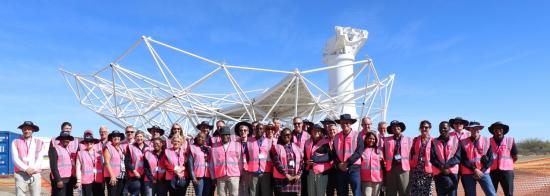Portugal
At a glance
- Over €4.1 million in SKAO contracts awarded to Portuguese institutions and companies
- 16 highly skilled jobs created in the advanced software industry
- Portuguese astronomers are involved in 10 of the 14 SKAO Science Working Groups.
- National participation is managed by the Portuguese Space Agency, acting on behalf of the Portuguese government.
National involvement
As a founding member of SKA, Portugal has committed to contributing 1.8% of the construction and operational budget of the Observatory.
During the design phase, Portuguese institutions and companies provided expertise in software, algorithm development, networks, power consulting, telescope operations, and observatory design and management. This effort was coordinated through the ENGAGE SKA Consortium, a national research infrastructure listed on the Portuguese Roadmap of Research Infrastructures of Strategic Interest.
The ENGAGE SKA serves as the science and technical interface between the Portuguese community and the SKAO, offering computing resources to the Portuguese team via the OBLIVION Supercomputer located at the University of Évora HPC Centre, and managed by the High-Performance Computing Chair on behalf of the ENGAGE SKA.

Industrial participation
Portuguese industry has secured SKAO contracts for developing services and infrastructure that underpin all software systems required for SKAO’s operation, from analysis and design to coding, testing, validation, maintenance, debugging, and documentation of software and computer systems. These contracts demonstrate how scientific investment leads to tangible industrial growth and technological progress for Portuguese companies, generating 16 highly skilled jobs in the software industry.
Furthermore, a considerable spill-over effect has been created through the HPC Chair, a research and development infrastructure at the University of Évora that originated from ENGAGE SKA. It unites a consortium of seven European universities (in Portugal, Spain and the UK), three research centres, one Collaborative Laboratory (CoLab), public organisations, and eleven enterprises, including leading technological companies such as Hewlett Packard Enterprise.
The consortium, through its HPC, AI, and Data Processing work packages, promotes the transfer of technologies and knowledge related to data storage and data processing models, as well as the effective use of HPC and AI. These capabilities are essential for managing the vast data volumes of the SKAO within a high-availability infrastructure, paving the way for potential certification of an SKAO Science Regional Centre. This centre addresses SKAO’s computing and data challenges with a strong emphasis on sustainability and carbon footprint reduction. It also plays a key role in training highly skilled professionals who are readily absorbed by the industry.
Science interests
Portuguese astronomers participate in 10 of the 14 SKAO Science Working Groups, with approximately 30 radio astronomers from 10 institutions contributing to the Observatory’s science and operations. The national community has organised two SKA-days, two industry meetings, and various seminars and sessions at major conferences. The Portuguese SKA White Book (Barbosa et al. 2020) documents this scientific engagement across astrophysics, cosmology, fundamental physics, and technological skills development in ICT, space, and energy systems.
Through ENGAGE SKA and the HPC Chair in Évora, research infrastructures now extend beyond astronomy, supporting various scientific disciplines within Portugal’s advanced computing network and aligning with EU PRACE and EuroCC policies.
Wider impact
The present and future impacts of SKAO are fully aligned with the national space strategy, Portugal Space 2030 – A research, innovation and growth strategy for Portugal, which prioritises:
- Developing human capital through advancing STEM education;
- Strengthening scientific diplomacy;
- Promoting technological innovation for social well-being and sustainability.
These priorities are reflected in Portugal’s achievements within the SKAO framework. The country excelled in the SKA Data Challenges (SDC1), applying advanced machine learning pipelines, and continues to support more recent challenges (SDC3, SDC4) through HPC infrastructures such as LCA-UC and Oblivion /HCP Chair – Évora.
ENGAGE SKA has also helped establish a new Dark Sky Destination in central Portugal (Aldeias do Xisto), certified by the Starlight Foundation and endorsed by UNESCO and WTO. This initiative led to the creation of a space situational awareness observatory (PASO), which now hosts dedicated instruments for near-Earth orbital monitoring (radar, radiotelescope, wide field telescope). Members of ENGAGE SKA also contribute to the IAU Centre for the Protection of the Dark and Quiet Sky from Satellite Constellation Interference (IAU CPS), supported by the IAU, NOIRLab (USA), and SKAO.
Industry partners have delivered sustainable energy solutions for remote SKAO sites, while international collaboration progressed through DOPPLER, a Portugal–Mozambique initiative funded by FCT and the Aga Khan Development Network. Based at the University Eduardo Mondlane and Osuwela ONG, DOPPLER has conducted over 10 workshops reaching more than 500 participants, enhancing skills in biodiversity, food security, and resource management, while fostering long-term cooperation in radio astronomy and Earth observation.
Designed and delivered by the Portuguese Higher Education Institutes
Portuguese institutions were actively involved in the design and construction phases of the SKAO, making strong contributions to several SKA Design Elements:
- Telescope Manager / Observatory Management and Control (OMC): Portugal was responsible for developing the computational infrastructure that supports near real-time monitoring and control of the telescopes and associated hardware infrastructure.
- Signal and Data Transport (SADT): Portuguese teams contributed technological expertise to the design of the data transport networks that will serve as the digital backbone of the SKA telescope.
- Power: Led by industry, Portuguese entities provided consultancy, design and prototyping of sustainable energy systems, testing power supply solutions suitable for the SKAO’s remote locations.
Contact
Portugal Space
Estrada das Laranjeiras, n.º 205, RC
1649-018, Lisboa
Portugal
Email: secretariado@ptspace.pt






